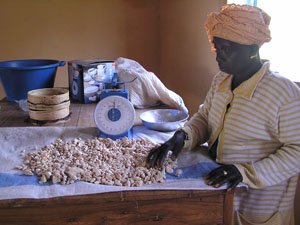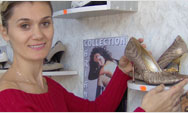You are here » Home » Telling Our Story
Success Story
Cooperative finds that powdering baobab fruit, jujubes increases value
Women Enjoy the Fruits of Their Labor

Photo: USAID/Senegal/Sega Dicko
Kadiatou Ndao processes baobab fruit kernels into a powder for sale in the Senegalese capital, Dakar. A USAID-funded activity helped her better understand the importance of adding value to her produce to generate more income.
“We have received a lot of support from USAID... We will keep working even after the project has finished,” said Kadiatou Ndao, who sells jujube and baobab powders.
Kadiatou Ndao is proud of her sacks brimming with baobab and jujube powder. In just three years, she has marketed enough powder pounded from dusty fruit kernels and berries to quadruple her profits.
Kadiatou is president of a baobab cooperative in Koussanar, a town in central Senegal. She said that before receiving support from a USAID agriculture and natural resources management project, the 28 women of her cooperative lacked the necessary skills, knowledge, and training to run a successful business.
They have since discovered that learning to process and sell baobab fruit and jujube is a life-changing experience. While one kilo (2.2 pounds) of unprocessed jujube (a dried berry) sells for the equivalent of 10 cents, one kilo of jujube powder, which can make 150 small sweet and sour jujube cakes sold for five cents each, is worth $7.50. Processing the dry, pulpy baobab fruit (which the Senegalese use to make a creamy juice) into a powder is also valuable, as the powder can easily be turned into a juice and thus can be marketed to busy families in Dakar.
The improved accessibility of the products is reflected in rising market demand. The women’s total revenues for baobab and jujube rose the past several years from $454 to $1,150. Kadiatou herself earned $300 in combined revenues from baobab fruit and jujube, which is four times as much as she earned three years earlier.
Kadiatou, who has not been able to have children of her own, adopted her deceased brother’s daughters. Her increased income allows her to send all four girls to school and pay for their supplies.
The women in the collective are unanimous in their appreciation of the USAID enterprise training that taught them how to develop a business plan, calculate costs, and understand the importance of planning, saving, and investing. “We have received a lot of support from USAID… We will keep working even after the project has finished,” said Kadiatou. “When we need training to reinforce what we have learned, we will do our best to finance it on our own.”
Print-friendly version of this page (533kb - PDF)
Click here for high-res photo
Back to Top ^
|




